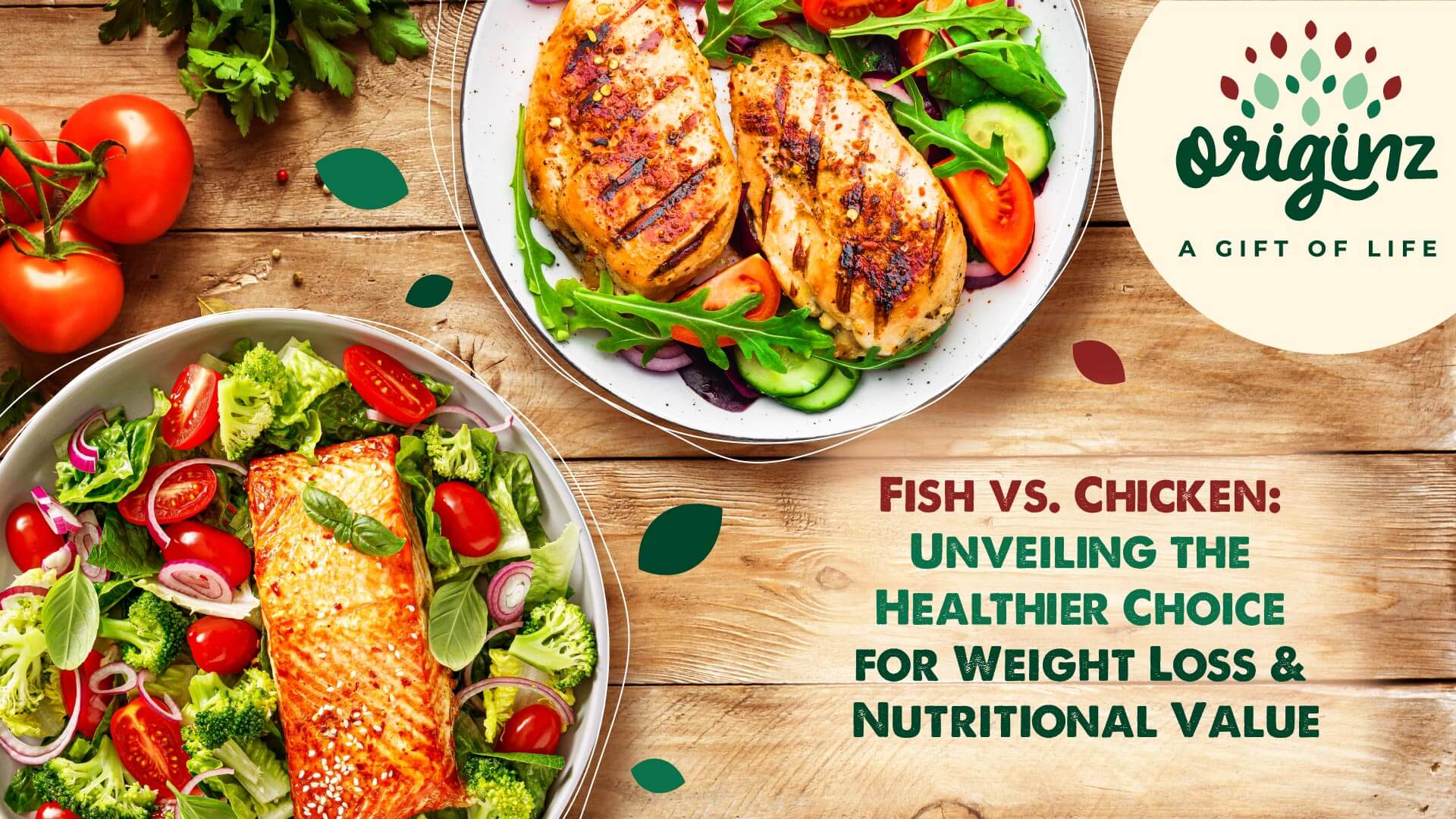
Fish vs. Chicken: Which one is Healthier Choice for Weight Loss?
The eternal debate between fish and chicken often takes centre stage when making healthy choices in our diet. Both options offer many benefits, but which is truly the better choice? In this comprehensive guide, we'll delve into the nutritional merits of fish vs. chicken, exploring their impact on weight loss and their respective benefits, and even share some delightful recipes for your culinary journey.
Fish vs. Chicken: A Nutritional Showdown
Fish vs. Chicken: Which is Healthier?
A closer examination of chicken and fish's overall health benefits marks the beginning of the conflict. Fish, known for its heart-beneficial omega-3 fatty acids, possesses these qualities. It is well known that omega-3 fatty acids promote brain health, lower blood pressure, and decrease inflammation. Conversely, chicken is a lean protein source, rendering it an indispensable component in muscle development and restoration.
Fish vs. Chicken: Weight Loss
The scales tip slightly in favour of fish for those on a weight loss journey. Fish tends to be lower in calories and saturated fats compared to specific cuts of chicken. Additionally, the omega-3s in fish may aid in weight loss by promoting fat-burning and reducing hunger. However, the key is moderation, as portion sizes and cooking methods also play a significant role.
Benefits of Fish: More than Just Omega-3s
Beyond its omega-3 content, fish offers a spectrum of nutrients. Fatty fish such as salmon and mackerel are rich in vitamin D, essential for bone health and immune function. Moreover, the selenium in fish is a potent antioxidant, guarding against cell damage. Incorporating a variety of fish into your diet ensures a diverse nutrient intake, contributing to overall well-being.
Benefits of Chicken: Lean Protein Powerhouse
Chicken, particularly skinless, boneless cuts, is a powerhouse of lean protein. Protein is vital for muscle maintenance, immune function, and satiety, making it an excellent choice for those seeking weight management. Additionally, chicken is a versatile option, allowing for various cooking methods and flavour pairings.
Nutritional Value of Chicken: A Closer Look
Delving into the nutritional value of chicken reveals a spectrum of essential nutrients. Chicken is rich in B vitamins, promoting energy metabolism, and minerals such as phosphorus, which are crucial for bone health. Opting for organic chicken ensures a cleaner source of protein, free from antibiotics and hormones.
The Organic Factor: Elevating Your Choices
Regarding fish and chicken, opting for organic varieties takes your health-conscious choices up a notch. Organic fish ensures a source free from harmful contaminants and supports sustainable fishing practises. Similarly, organic chicken guarantees a poultry product free from synthetic additives, contributing to a cleaner and more environmentally friendly food supply chain.
Delicious Recipes for Fish and Chicken Lovers
Now that we've dissected the nutritional aspects let's explore some mouth-watering recipes to elevate your culinary experience.
Grilled Lemon Garlic Salmon
Ingredients:
Fresh salmon fillets
Lemon juice
Minced garlic
Olive oil
Salt and pepper to taste
Instructions:
Marinate salmon with lemon juice, minced garlic, olive oil, salt, and pepper.
Grill until the salmon flakes easily with a fork.
Serve with a side of steamed vegetables for a nutritious, weight-loss-friendly meal.
Herb-Roasted Organic Chicken Breast
Ingredients:
Organic chicken breasts
Fresh herbs (rosemary, thyme, sage)
Olive oil
Salt and pepper to taste
Instructions:
Rub chicken breasts with olive oil, fresh herbs, salt, and pepper.
Roast in the oven until golden brown and cooked through.
Pair with a quinoa salad for a wholesome organic feast.
Fish vs Chicken: Making the Right Choice for You
In the fish vs. chicken debate, there's no one-size-fits-all answer. Achieving a balanced diet is crucial, as both alternatives provide distinct advantages. Having a healthy and gratifying culinary experience is possible by making well-informed decisions and delicious recipes, regardless of whether one prefers the omega-3 benefits of fish or the versatile protein content of chicken. It is not merely the content that matters but how it is prepared and savoured.
FAQs: Fish vs. Chicken
Chicken or fish, which aids in weight loss more effectively?
In addition to the metabolism-boosting properties of omega-3 fatty acids and its lower calorie and saturated fat content, fish is generally regarded as a more beneficial food for weight loss.
What health benefits do chicken and fish provide?
Omega-3s, which are beneficial to the heart, are found in fish, whereas lean protein sources such as chicken are vital for immune function, muscle maintenance, and satiety.
Should I go for organic fish and chicken?
Selectingorganic food alternatives guarantees the utilisation of hygienic sources devoid of synthetic additives and contaminants, positively impacting individual well-being and promoting sustainable food practices.
Further Read,
Latest Blogs

Maintaining Healthy Habits After Ramadan
Have Ramadan healthy meals after Ramadan and maintain healthy food habits and implement them in your daily lives. Read more about healthy food habits.

Authentic Middle Eastern Iftar Meals to Prepare This Ramadan
Prepare some authentic middle eastern iftar meals this Ramadan. Look for fresh Ramadan food ideas and make your day memorable with these dishes. Check them out.

Eid-al-Fitr Feast: Delicious Recipes to Celebrate the End of Ramadan
Celebrate the end of Ramadan with delicious recipes on the eve of Eid ul Fitr. Read more about the traditional Ramadan recipes and make them easily.

Ramadan Dishes to Cure Fasting Fatigue
Don’t worry about fasting fatigue anymore as we have listed some best Ramadan dishes and easy iftar meals to support your fasting journey. Check them out.